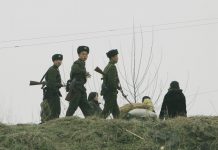North Koreans in some regions of the country have filed complaints with party authorities against people’s committeeNorth Korean people's committees are akin to local governmen... More officials and construction managers for corruption in rural housing construction, and investigations are under way on the orders of the Central Committee.
“In early March, party committees in Sariwon, North Hwanghae Province, and Wonsan, Kangwon Province, received complaints about people’s committeeNorth Korean people's committees are akin to local governmen... More officials and construction managers engaging in various forms of corruption under the pretext of the party’s rural housing construction policy, and the complaints were reported to the Central Committee,” a Daily NK source in North Korea said Wednesday, speaking on condition of anonymity. “The central committee said it would punish the corrupt officials after a thorough investigation.”
According to the source, one complaint accused a Sariwon People’s CommitteeNorth Korean people's committees are akin to local governmen... More official of putting a relative in charge of the rural housing construction team and stealing construction materials.
Another accused the people’s committee-appointed chief of staff at the Wonsan Rural Housing Construction Headquarters of allocating houses three months before their completion and instructing families to “ensure completion” by purchasing the doors, windows, glass and plastic sheeting themselves. He also allegedly made some money by selling the materials – at market prices – to families who could not afford them.
A flood of complaints in Anju and Hamju counties, South Pyongan Province, accused builders of causing hardship on people through shoddy construction.
According to one complaint, the houses in Anju do not have septic tanks, so wastewater from bathrooms and kitchens is not properly treated. Yet those responsible for building the houses feign ignorance and refuse to fix the problem.
One complaint from Hamju County said that the ceilings of the one-story rural homes are stained with water in the rain due to poor roofing, and noted the astronomical difference in quality between their homes and those near the Yonpo Greenhouse Farm, where North Korean leader Kim Jong Un attended an event.
Local party committees, which received the complaints earlier this month, reported them to their provincial party committees, which reported them to the Central Committee.
In response, the Central Committee said it would use the opportunity to conduct a thorough investigation, together with the Ministry of Social Security, into the corruption and shoddy work of construction managers and related people’s committeeNorth Korean people's committees are akin to local governmen... More officials involved in the construction of rural housing, and subject the guilty parties to severe party and criminal punishments, the source said.
Specifically, the Central Committee ordered provincial party committees and provincial police to conduct joint investigations to determine whether local people’s committees granted special favors or engaged in other forms of corruption in the construction of rural housing in regions other than those named in the complaints.
Provincial party committees were ordered to report their findings by the end of the month.
“Rural housing construction managers in some regions are complaining that people used to say it was okay to build shoddy housing, but now they are questioning how we did our job,” the source said.
“The wives of the people’s committeeNorth Korean people's committees are akin to local governmen... More officials and construction managers under investigation hate the people who filed the complaints and hold a grudge against them,” he said. “In response, the Ministry of State Security has issued an internal order to local ministry branches to keep a lid on things during the investigation into corruption in rural housing construction so that public tensions don’t rise.”
North Korea is building rural housing nationwide in accordance with the party’s “new socialist rural housing” policy, which was announced at the Fourth Plenary Session of the Eighth Central Committee in late December 2021.
The policy aims to improve people’s living conditions by building modern homes in rural communities, and because of its fundamental focus on regional development, it is being called a North Korean version of South Korea’s Saemaul (New Village) movement, which significantly improved rural living conditions in South Korea in the 1970s.
Translated by David Carruth. Edited by Robert Lauler.
Daily NK works with a network of sources living in North Korea, China, and elsewhere. Their identities remain anonymous for security reasons. For more information about Daily NK’s network of reporting partners and information-gathering activities, please visit our FAQ page here.
Please send any comments or questions about this article to dailynkenglish@uni-media.net.



















